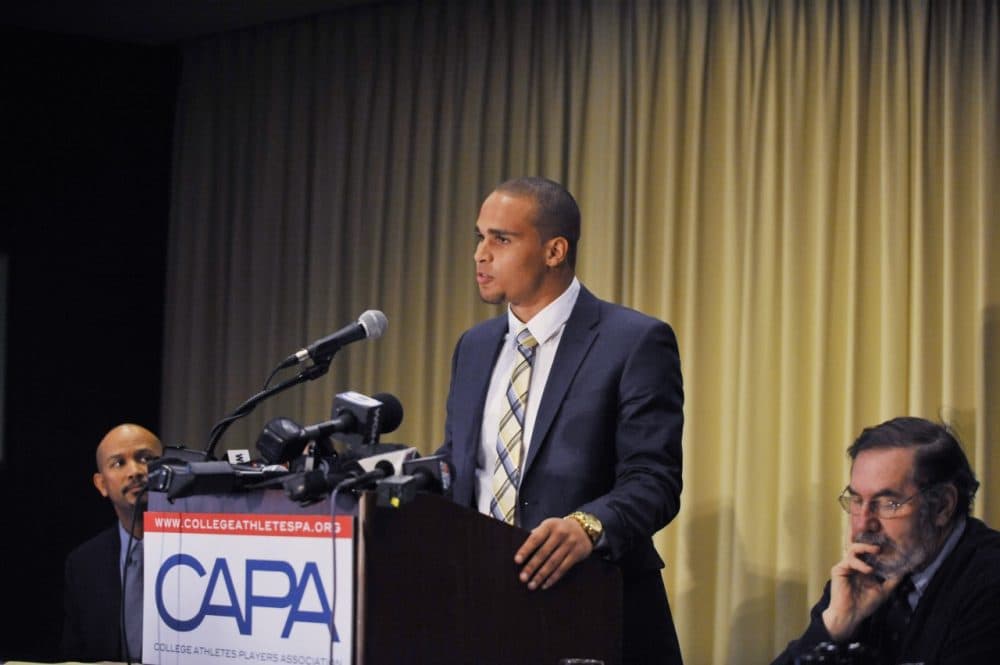Advertisement
Northwestern Football Tries To Unionize
Resume
On Tuesday, the president of the National College Players Association filed a petition on behalf of Northwestern University football players at the Chicago office of the National Labor Relations Board. For the first time in the history of college sports, athletes are asking to be represented by a labor union and to be formally recognized as employees.
Patrick Hruby, who’s been writing about the story for Sports On Earth, joined Bill Littlefield.
BL: What led to Tuesday’s request for a union by Northwestern’s football players?
PH: The players basically feel like this is the best--and maybe the only--way that they’re going to have a voice when the NCAA and its member schools make decisions about the policies and the rules and the whole structure of college sports that affects their daily lives. If you look at what they are asking for, their initial demands are not, as many people seem to think, "pay us."
Their demands are actually, “We want much better protection for head trauma.” They also want better protection in terms of their normal healthcare. The NCAA does not have to cover these athletes in terms of health insurance. Their kind of on their own when they incur these injuries playing college football.
BL: All of that not withstanding, the issue of pay-for-play is likely to come up if this union movement goes forward, right?
PH: It's hard to see how it wouldn't. There's just so much money in college football now. We're talking about billions of dollars. The other thing is NCAA amateurism, which is not just schools saying, "We're not going to pay you beyond the value of a scholarship." It's schools saying, "We're going to dictate the terms of your economic life. You can't be paid by this booster. You can sign an autograph for money if the money goes to our athletic department, but not to your pocket." I think that would be the first thing that a union of college athletes might sit down at the bargaining table and say we're not OK with this.
BL: What is the NCAA's argument against unionizing players?
PH: Well the NCAA's argument against this is the same argument they have that basically upholds amateurism, which is these college athletes are "student-athletes." What they do is play. They're not employees. And it's one that's been in place since the 1950s.
Most people don't know this, but the term student-athlete is basically a term of legal fiction that was created by the NCAA because back then they were ordered to have to pay workers compensation to the families of football players who had died, and they didn't want to have to start playing workers comp. And amazingly enough, for 50-plus years the federal judiciary has pretty much given them a pass on that.
BL: This movement could well go beyond Northwestern and even beyond college football and into other sports, right?
PH: I think so. I mean right now they're saying, look we are sticking with college football and potentially college basketball players. That's where the big money and revenue are. They say it's a place where you can make the best case before the National Labor Relations Board that these college athletes are, in fact, employees. But they said that if they are successful, they are absolutely open to other athletes from other sports. And what's really important about that is that means they'd be recognized as employees, and that's what threatens to change the entire model of college sports as we know it.
BL: This mater is now in the hands of the National Labor Relations Board. Do you have any sense of what the board will decide and when they'll decide it?
PH: I really don't know. I think it's going to be a long process. Northwestern can say we accept this or we don't. I'm sure they'll say we don't accept it. They've already said they don't agree with this publicly. Once Northwestern says no, it goes to a local labor relations board. They make a ruling. Whatever the ruling is it can then be appealed to a national board. Once it's appealed there, it will go to the federal courts, and then there'll be another series of appeals and rulings. So this could take years.
This segment aired on February 1, 2014.